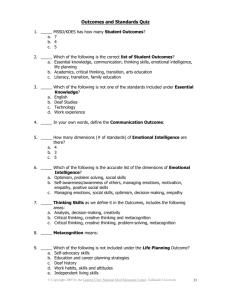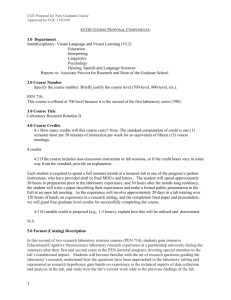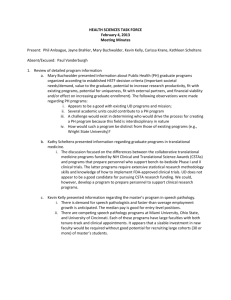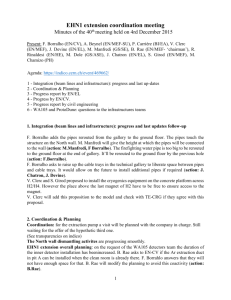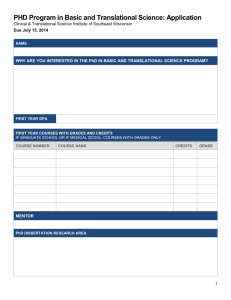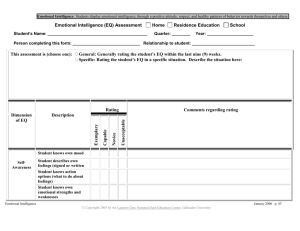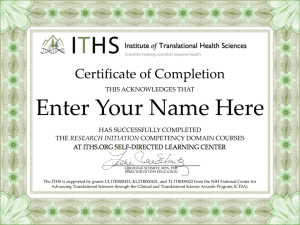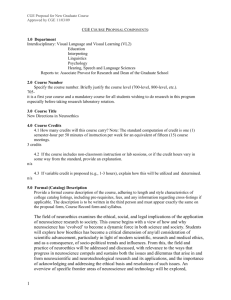PEN 801 - Proposal - Gallaudet University
advertisement
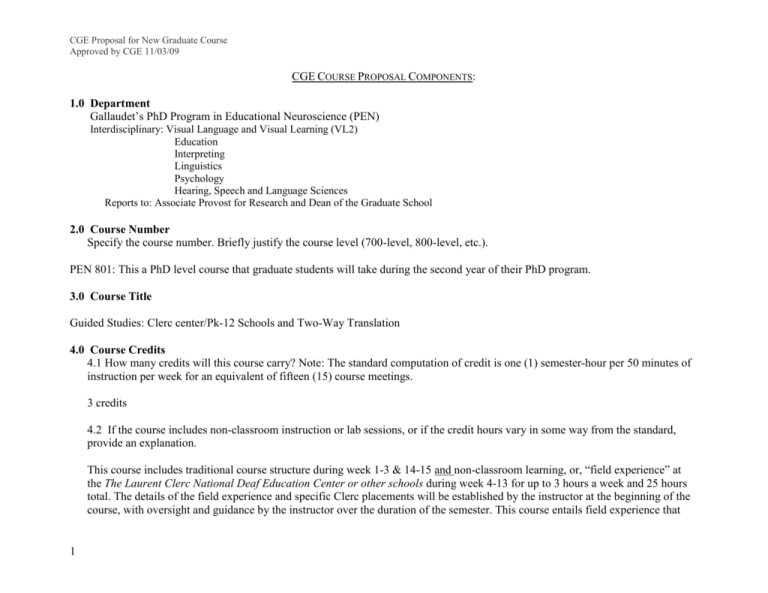
CGE Proposal for New Graduate Course Approved by CGE 11/03/09 CGE COURSE PROPOSAL COMPONENTS: 1.0 Department Gallaudet’s PhD Program in Educational Neuroscience (PEN) Interdisciplinary: Visual Language and Visual Learning (VL2) Education Interpreting Linguistics Psychology Hearing, Speech and Language Sciences Reports to: Associate Provost for Research and Dean of the Graduate School 2.0 Course Number Specify the course number. Briefly justify the course level (700-level, 800-level, etc.). PEN 801: This a PhD level course that graduate students will take during the second year of their PhD program. 3.0 Course Title Guided Studies: Clerc center/Pk-12 Schools and Two-Way Translation 4.0 Course Credits 4.1 How many credits will this course carry? Note: The standard computation of credit is one (1) semester-hour per 50 minutes of instruction per week for an equivalent of fifteen (15) course meetings. 3 credits 4.2 If the course includes non-classroom instruction or lab sessions, or if the credit hours vary in some way from the standard, provide an explanation. This course includes traditional course structure during week 1-3 & 14-15 and non-classroom learning, or, “field experience” at the The Laurent Clerc National Deaf Education Center or other schools during week 4-13 for up to 3 hours a week and 25 hours total. The details of the field experience and specific Clerc placements will be established by the instructor at the beginning of the course, with oversight and guidance by the instructor over the duration of the semester. This course entails field experience that 1 CGE Proposal for New Graduate Course Approved by CGE 11/03/09 will require students to spend some time “on-site” at the Clerc center/pk-12 schools. This will entail several learning opportunities, e.g., interacting with an on-site mentor, interviewing Clerc center/pk-12 schools administrators and personnel, observing directly teachers and children spanning different grade levels, and reading extensively the literature on central issues in translational research at the heart of contemporary education, and especially the education of deaf children today. 4.3 If variable credit is proposed (e.g., 1-3 hours), explain how this will be utilized and determined. This is a 3 credit course. 5.0 Formal (Catalog) Description Provide a formal course description of the course, adhering to length and style characteristics of college catalog listings, including pre-requisites, fees, and any information regarding cross-listings if applicable. The description is to be written in the third person and must appear exactly the same on the proposal form, Course Record form and syllabus. Course Description: In this first of a three-part sequence of intensive guided study courses (in class discussion and field experience), Guided Studies (I): Translation (PEN 801), students advance their knowledge in making “two-way” connections between basic research discoveries and educational translation, with a special focus on building students’ understanding of the priorities, prevailing issues, translational challenges, and translational successes that are of looming importance in education today. Students will interact with educational personnel, parents, and deaf and hard of hearing children in the greater Washington area (for example, the Laurent Clerc National Deaf Educational Center administrators, teachers, children, and parents). The PEN student will gain new knowledge spanning K-12 educational settings, understand the many processes involved in going from translational research outcomes to and educational policy change, and gain specific and crucial new knowledge about the education of the young deaf visual learner. On-site oversight of the student will occur through close, mutually rewarding collaboration with members of the school. Both a written paper on the topic of translational research as well as a presentation of this paper to the student’s PEN Program Committee, will comprise the student’s first-year Preliminary Exams, which will occur at the end of this course. 6.0 Prerequisites 6.1 List the prerequisites and/or co-requisites for this course. Prerequisites: First-year required/core courses and lab rotation in the PEN PhD program. (This is a second year, first term/fall required course in sequence.) 6.2 Provide a brief rationale for prerequisites and/or co-requisites, The first year required courses/lab rotation will provide the student with the necessary foundational knowledge and preparation to make this Guided Studies I/Translation experience at The Clerc center/pk-12 schools a most meaningful and knowledge-rich learning experience. 2 CGE Proposal for New Graduate Course Approved by CGE 11/03/09 6.3 If prerequisites and/or co-requisites involve other departments of instruction, provide evidence of acknowledgement and cooperation from these departments (e.g. letters of support). n/a 7.0 Rationale for proposed course 7.1 Why is this course being proposed? Provide a rationale. First, the course fits ideally with the goals and mission of the PhD program in Educational Neuroscience (PEN) that is being considered presently. Both this program and the multidisciplinary field of Educational Neuroscience require knowledge in the translation of science to education and vice versa (intended to be strengthened here in Guided Studies I/Translation), the scientific process (intended to be strengthened in Guided Studies II/Research), and the theoretical foundations of one’s specific area of focus (intended to be strengthened in Guided Studies III/Theory). Second, PEN is an outgrowth of the vision of the National Science Foundation’s Science of Learning Center, Visual Language and Visual Learning, VL2 at Gallaudet. In turn, part of the innovation, like the very field of Educational Neuroscience itself, is to building meaningful, two-way activities spanning science and education. This course represents one meaningful step towards this end. Third, through our collaborative efforts, the Laurent Clerc National Deaf Center expressed an interest and need for such a course. For example, as can be see in the attached letter, Dr. Ed Bosso, Vice President of the Laurent Clerc National Deaf Education Center writes, “We look forward to working with you to ensure students in this [PEN] program have the necessary experience in K-12 settings to support their learning and future employment goals.” Finally, there is indeed a need for the graduates to develop a skill and expertise in the area of translation studies to K-12 audiences. As above, by interacting with the Clerc center/pk-12 schools administrators, teachers, students, and parents, PEN students will build knowledge, application, and experiences needed to meet the program learning outcomes. 7.2 Describe any actual or apparent overlap with current course offerings. If other departments are impacted by this course, provide evidence of consultation with and support from those departments (e.g. letters of support). To the best of our knowledge, there is no overlap with current course offerings. 3 CGE Proposal for New Graduate Course Approved by CGE 11/03/09 8.0 Grading System State whether letter-grade or pass/fail system will be utilized; if the latter, provide a brief rationale. Letter-grade 9.0 Course Characteristics 9.1 If the course is to be cross-listed (within a single department, or across more than one department), provide a rationale and full documentation of steps taken to assure such listings. The course will not be cross-listed. 9.2 If the course is open to both undergraduate and graduate students, provide a rationale for doing so and explain any differences in requirements for undergraduate and graduate students. This course is offered only to graduate students. 9.3 Explain how this course fits with the other department offerings. Is this course a required course (in which case it must be accompanied by a proposal for Change to Existing Program) or an elective course? This is a required course in this new PEN PhD program. 9.4 Describe the intended student-audience for this course. If substantial numbers of students from outside the department are expected to enroll in this course, provide evidence of support and cooperation from these departments in terms of enrollment and compatible scheduling. This course is only offered to graduate students in PhD program in Educational Neuroscience so as to advance their educational learning outcomes in this PEN program. 9.5 What is the anticipated starting date for this course? How frequently and in which semester(s) will the course be offered in the future? How many sections of this course will typically be offered simultaneously? Fall 2014. The course is offered annually to PEN graduate students only, and in their second year of study, Fall semester. This is one course (no sections). The course occurs in a particular sequence in the PEN graduate student’s study. 10.0 Instructor 4 CGE Proposal for New Graduate Course Approved by CGE 11/03/09 Describe necessary instructor competencies and qualifications to teach the course. The course requires an instructor who holds a doctoral degree, and who possesses educational/translational experience, and who has expertise in university instruction and research. 11.0 Course Format and Procedures Describe how the course will be conducted, in terms of class meetings and teaching procedures. For example, will the course be taught online only, or as a hybrid of online and classroom meetings? Will the course incorporate lectures, discussions, lab sessions, small-group or individualized instruction, practicum or field experiences, student reports or projects, competency-based modules, or other types of instructional procedures? There will be no online meetings. This course will incorporate lectures, discussion, field experiences, and report. There will be core meetings with the instructor and significant intensive field experience at the Clerc center/pk-12 schools. The student will receive much individualized instruction in the on-site field experience (e.g., with on-site mentor at the Clerc center/pk-12 schools). Course instructor will also provide both guidance on the (i) final paper, which will be a critical/analytical analysis focusing specifically on the topic of translational research that bridges science and education, especially the education of the young deaf visual learner, as well as the students’ (ii) oral presentation of this translational research paper. 12.0 Evaluation of Course and Course Instructor Describe how course instruction and the course itself will be evaluated, including any long-term strategies for evaluating the course as part of the department offerings. The course will be evaluated based on student responses (students will complete a course assessment at the end of the semester), as well as to evaluation of the program itself, and the instructor’s evaluation of the students, as per the course/program SLOs. The course will also be evaluated as part of the PEN PhD program evaluation scheduled for one year after its creation, and regularly thereafter. 13.0 Resources Describe the immediate and future impact the offering of this course is likely to have on the department's personnel, physical, and financial resources. None anticipated. 14.0 Alignment of proposed course goals with those of academic program 5 CGE Proposal for New Graduate Course Approved by CGE 11/03/09 14.1 Program mission statement The exciting new multidisciplinary field called Educational Neuroscience, and the new PhD program in Educational Neuroscience at Gallaudet University, are bound by two driving overarching objectives: (i) to marry leading scientific discoveries about how children learn knowledge that is at the heart of early schooling (e.g., language, reading, number, science, social-emotional) with core challenges in contemporary education, and to do so in principled ways through “two-way” communication and mutual growth between science and society; (ii) to conduct state-of-the-art behavioral and neuroimaging research that renders new knowledge about learning that is useable and meaningfully translatable for the benefit of society (spanning parents, teachers, clinicians, medical practitioners, and beyond). Here, Gallaudet’s unique strength, and unique contribution, is to pioneer advances in the education of young deaf children. The new PhD Program in Educational Neuroscience also seeks to propel forward Gallaudet University’s goals to provide its students with the most cutting-edge knowledge, powerful critical analysis and reasoning skills, and utterly advanced knowledge of, and expertise in, research and its principled application (here, neuroimaging and behavioral research), which are vital to education and society. 14.2 Program Student Learning Outcomes List the Student Learning Outcomes for your academic program. 1. The students will acquire a foundational knowledge of the educational, neurological, behavioral and cognitive determinants, and sociocultural practices that impact all human learning, especially learning in the young deaf visual learner. 2. The students will be exposed to a range of specialized topics and principles and scientific methods and understand the ethical principles of research conducted with participants. 3. The students will develop knowledge of the meaningful and principled, mutually beneficial, two-way means and methods to translate scientific discoveries to education and education to science. 4. The students will develop research skills and critical thinking by demonstrating the ability to conduct independent research leading to dissertation and publication. 5. The students will develop professional communication and technology skills. 6. The students will demonstrate increasing independence throughout the training period, and show a readiness for entry-level faculty research positions. 6 CGE Proposal for New Graduate Course Approved by CGE 11/03/09 14.3 Course Student Learning Outcomes List the Student Learning Outcomes for your proposed course. Then in table format, using the template provided below, list the learning outcomes and show how the course and program SLOs align by placing checks in the appropriate cells. Note: The three Guided Studies Courses in this PEN PhD program have the same overarching learning outcomes that include gaining specific hands-on knowledge in topics at the core of the PEN PhD program mission. Guided Studies 1: Translation (Clerc center/pk-12 schools and Two-Way Translation) provides hands-on opportunities to understand the meaningful, principled two-way marriage that is possible between science and education and education and science. Guided Studies II: Research provides hands-on opportunities to advance in the core research tools and methods of Educational Neuroscience so that the student gains knowledge in how to do meaningful science with translational impact. Guided Studies III: Theory provides hands-on opportunities to advance in the specific core domain in which the student will become an expert in the field of Educational Neuroscience (e.g., how young children and the visual learner learns math, language, or reading, and the like); indeed this invaluable course will make possible the student’s advancement in knowledge that will serve as the foundation of their doctoral proposal, doctoral research, and doctoral written and oral defense. An overarching learning objective for this Guided Studies: I (Clerc center/pk-12 schools and Two-Way Translation) course is for students to engage in intensive field experience at the Laurent Clerc National Deaf Educational Center. There, students will gain hands-on experience in K-12 educational settings with young deaf visual learners while working in collaboration with an on-site mentor. Through course readings selected by the course instructor and the student, students will gain knowledge of translational research, its relation to educational practice and educational policy and the challenges and successes at the heart of translational research. Students will identify a specific domain of translational research that they are most interested in and will read critically and analytically in that area in preparation for their end of term written paper and oral presentation of the paper. (1) Students will learn about translational research and issues (challenges/successes), and its relation to educational practice and educational policy, across the K-12 educational setting, especially involving the young deaf visual learner. (2) Students will formulate new knowledge about ways to promote two-way, mutually beneficial translational research and exchange among researchers, educators, and the community. 7 CGE Proposal for New Graduate Course Approved by CGE 11/03/09 To promote further the above learning outcome, the course instructor will meet with representatives from the Clerc center/pk-12 schools and will establish learning goals and outcomes that will be most productive and beneficial both for the Clerc center/pk-12 schools and for the student. See Table below. 14.4 Learning Opportunities Briefly describe the Learning Opportunities (eg. assignments, projects, activities, reports, field experiences, etc.) designed to achieve the course Student Learning Outcomes. List them in table format, using the template provided below, and briefly state how they will be assessed (eg. what assessment methods will be used?). See Table below. 14.5 Assessment Methods Attach assessment tools used in this course (include grading scales, rubrics, checklists, etc.) to the syllabi accompanying this proposal. Do not attach them to the proposal itself. See syllabus and chart below. Learning Outcomes Linked to Student Learning Opportunities PEN 801 Guided Studies: Translation (Clerc center/pk-12 schools and Two-Way Translation) Course student Learning Outcomes (1) Learn about translational research and issues (challenges/successes) and its relation to educational practice and educational policy, across the K-12 educational setting, especially involving the young deaf visual learner. 8 Student Learning Opportunities Readings Interactions with Clerc center/pk-12 schools mentor and members Experiences with young deaf visual learners across K-12. Assessment Method Program Learning Outcomes I Rubrics assessing: Students’ written reports, final paper, and final x presentation (see appendix X) II III IV V VI x x x x x CGE Proposal for New Graduate Course Approved by CGE 11/03/09 2. Understand “Two-Way” knowledge exchange between science and education/vice-versa “Two-Way” knowledge: Demonstrate an ability to understand and critically evaluate scientific knowledge that has Translational Impact, and classroom practices that would benefit from evidenced-based/scientific investigations 3. Understand the relationship (and steps/processes) among science discoveries, translational research, translational research outcomes, educational change, and educational policy change. 4. Complete a high quality, critical analysis paper on a topic in translational research of student selection in which they formulate new knowledge about ways to promote two-way, mutually beneficial translational research and exchange among researchers, educators, and the community. 9 Student written reports on their experiences in studying and observing translational research projects in educational settings (through weekly blogs/written educational portfolio entries); discussions about their experiences, and research paper and final presentation Student written reports during the semester on their experiences at the Clerc center/pk-12 schools in relation to their readings and critical analysis; discussions about their experiences in class; discussions with their on-site Clerc center/pk-12 schools mentor, and Clerc members, and final paper, final presentation Student written reports on their experiences at the Clerc center/pk-12 schools; class discussions; discussions with Clerc center/pk-12 schools mentor, members. Rubrics are used to assess participation in discussions, literature review, reports, and final paper. Written assessment of student learning prepared by the Clerc center/pk-12 schools on-site Mentor. Rubrics are used to assess participation in discussions, literature review, reports, and final paper. Rubrics are used to assess participation in discussions, literature review, reports, and final paper. x x x x x x x x x x x x x x x x x x CGE Proposal for New Graduate Course Approved by CGE 11/03/09 10

